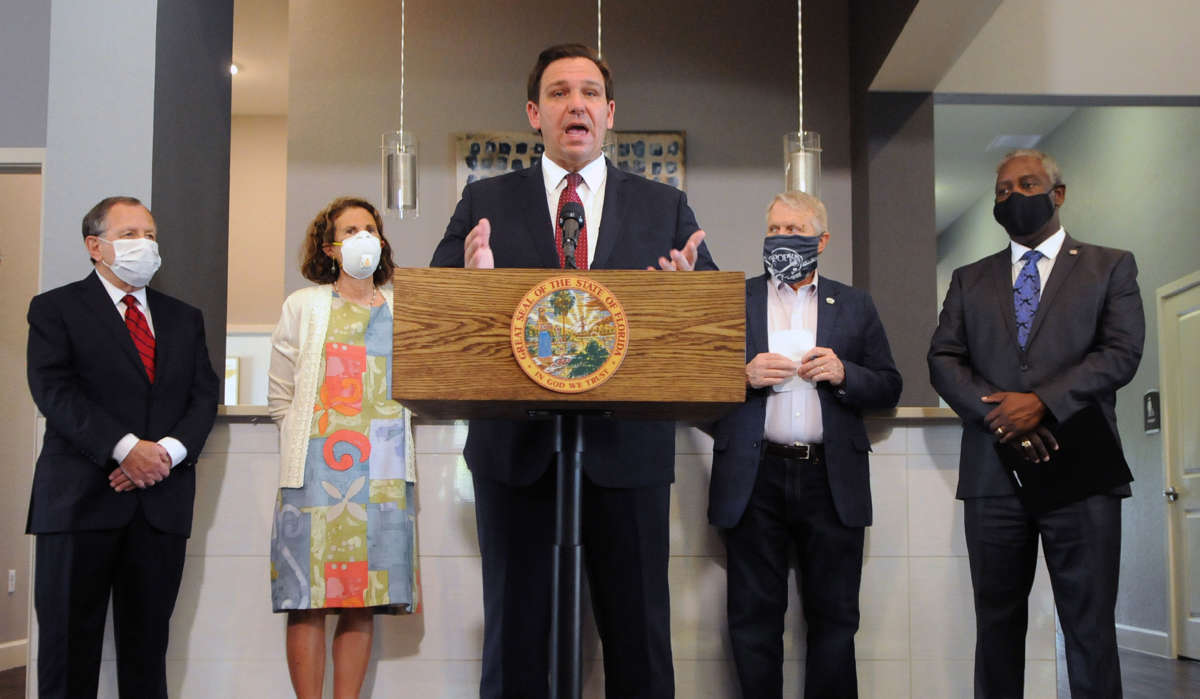Honest, paywall-free news is rare. Please support our boldly independent journalism with a donation of any size.
Coronavirus cases are on the rise in every single state in the South. Eleven Southern states have seen record single-day increases in COVID-19 cases in the month of July, and ICUs are filling up across the region as deaths continue to climb. Things are, to put it mildly, not going well. It might be hard to overstate how dire the situation has become.
Medical experts broadly agree that masks are key to fighting the spread of COVID-19, and that even homemade masks, worn properly, can significantly reduce the aerosol droplets that are thought to spread the virus. The Centers for Disease Control and Prevention published an editorial in the Journal of the American Medical Association this week calling for universal masking. And with homemade masks now widely available and thought to be effective, there’s increasingly little excuse for people not to wear one in public settings.
“The option of universal masking is no longer held back by shortage,” as the authors of a recent piece in Science Magazine wrote.
In the South, until recently, universal masking had been held back by governors. But faced with an increasingly dire outlook, even some of the region’s most conservative governors have relented, instituting masking orders in the last few weeks. Of the eight Southern states with statewide mandates, five enacted them in July alone; another five Southern states remain without such orders.
Govs. Asa Hutchinson of Arkansas and Kay Ivey of Alabama, both Republicans, are the two to most recently announce a statewide mandate. For months, Hutchinson had resisted calls to impose a statewide order, instead telling CNN’s State of the Union that he would not issue what he called an “unenforceable” mandate. But he relented on July 16 — following a call from the Arkansas Democrat-Gazette’s editorial board to institute mandatory masking, and after the previous day’s announcement that Arkansas-based Walmart, the world’s largest retailer, would require masks for all who enter its stores.
Ivey enacted a statewide order one day before Hutchinson, less than a week after the state’s record daily jump in COVID-19 cases, and as hospitalizations continued to rise. More than 87% of Alabama’s ICU beds are full, Ivey said in the news conference announcing the mandate.
And even Texas Gov. Greg Abbott (R), who resisted a statewide stay-at-home order for weeks in March and forged ahead with reopening as COVID-19 deaths climbed in the state, instituted a statewide mask mandate in early July. Many parts of Texas are in a state of crisis, with hospitals overwhelmed and cases continuing to rise.
Mask-wearing has become a political flashpoint during the pandemic. President Donald Trump has appeared in public wearing a mask only once. Among some conservatives, mandated masking has come to be seen as a form of government tyranny. Despite scientists, public health officials, and even some Fox News hosts agreeing that masks help prevent the spread of a lethal virus, they have become a divisive cultural symbol. And it’s hard not to notice that two of the Southern governors most opposed to mask mandates — Ron DeSantis of Florida and Brian Kemp of Georgia — are also two of Trump’s most stalwart supporters.
Kemp went in the opposite direction of many of his fellow governors in recent weeks, signing an executive order this week that explicitly bans Georgia localities from enacting mask mandates of their own. A similar executive order signed earlier in the pandemic had prohibited cities from ordinances that differed from statewide guidance but did not explicitly ban masks. His latest order, which voids mask ordinances in more than a dozen Georgia localities, was met with derision from the mayors of some of Georgia’s biggest cities. “Governor Kemp does not give a damn about us,” Savannah Mayor Van Johnson tweeted.
And even as COVID-19 cases climb dramatically in Florida, which set a single-day record for any state with 15,300 confirmed cases last weekend, DeSantis is standing firm. Though he wore a mask during a media event for the first time earlier this week, he has resisted instituting a statewide mask mandate, despite calls from Democratic lawmakers and mayors to do so. DeSantis has encouraged Florida residents to wear them but has balked at issuing a legally enforceable order. “When you attach criminal penalties for something, you’ve got to enforce it,” he said. “The question is, in some parts of Florida, is that really a good use of resources?”
Advocates for statewide mask mandates say that even orders that are not enforceable can go a long way in encouraging people to mask up. Ivey noted that the executive order she signed in Alabama is a tool of information, not one that will be used punitively.
“We are not asking sheriffs or police officers to seek out people not wearing a face mask,” she said. “Our goal is to inform people.”
Trump is silencing political dissent. We appeal for your support.
Progressive nonprofits are the latest target caught in Trump’s crosshairs. With the aim of eliminating political opposition, Trump and his sycophants are working to curb government funding, constrain private foundations, and even cut tax-exempt status from organizations he dislikes.
We’re concerned, because Truthout is not immune to such bad-faith attacks.
We can only resist Trump’s attacks by cultivating a strong base of support. The right-wing mediasphere is funded comfortably by billionaire owners and venture capitalist philanthropists. At Truthout, we have you.
We’re in the midst of a fundraiser, and as of right now, we have until midnight to raise $10,000. Please take a meaningful action in the fight against authoritarianism: make a one-time or monthly donation to Truthout. If you have the means, please dig deep.
